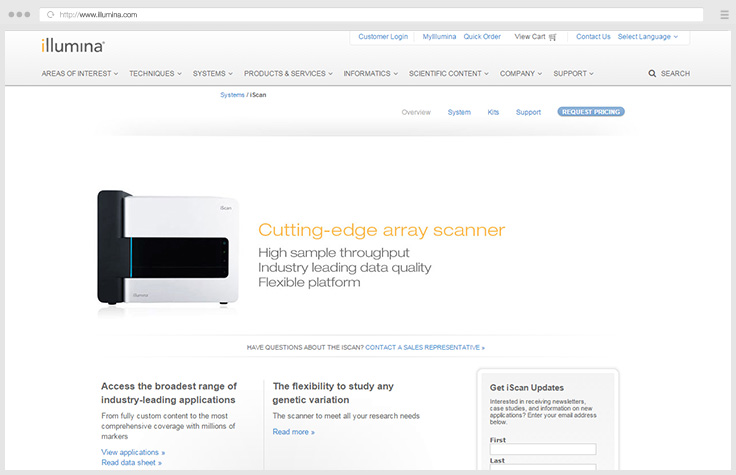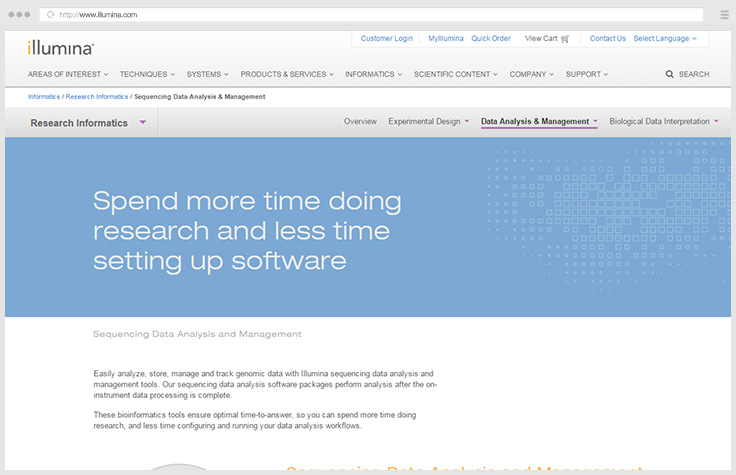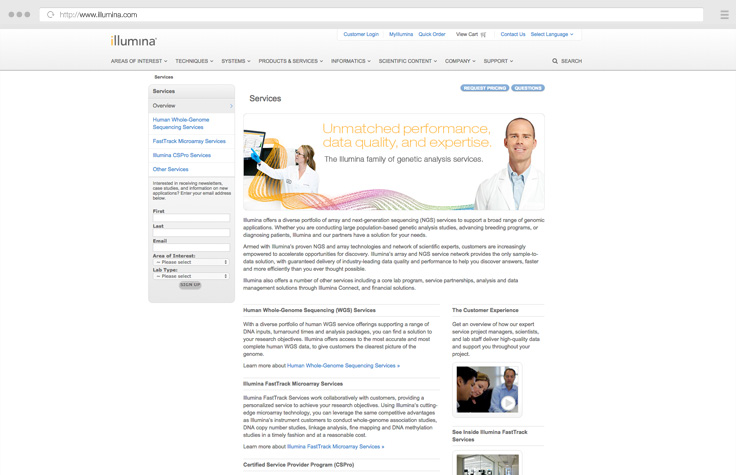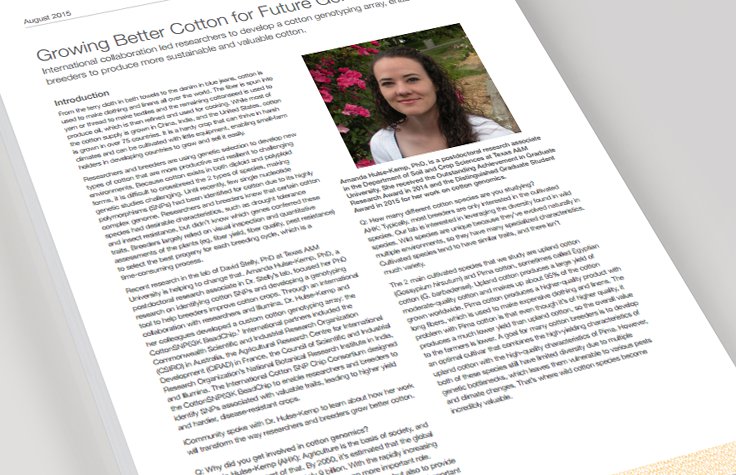맞춤형 유전형 분석
맞춤형 유전형 분석 소개
맞춤형 유전형 분석은 새로운 콘텐츠 또는 표적 콘텐츠에 대한 대규모 샘플 세트 스크리닝에 이상적인 솔루션입니다. 맞춤형 설계로, 연구자들은 특정 연구 관심사항과 관련된 유전체의 영역을 대상으로 할 수 있습니다. Illumina는 유연한 옵션과 간단한 온라인 설계 도구를 제공하여 맞춤형 유전형 분석으로 성공을 극대화합니다.
맞춤형 유전형 분석의 장점
- 표준 제품이 지원하지 않는 종 또는 집단에 대한 연구 가능
- 연구자들이 특정 질병 또는 관심 형질과 관련이 있으나 사전 설계된 제품에서 다루지 않는 관심 유전자, 변이 및/또는 유전체 영역에 집중할 수 있음
- 관련성이 낮은 유전체 영역을 피하여 리소스 절약
맞춤형 유전형 분석 어레이
완전 맞춤형 어레이
맞춤형 유전형 분석 어레이는 신규 유기체를 포함한 모든 종에 대해 게놈 전체에 걸친 모든 유전자좌를 표적으로 하는 700,000개의 마커로 쉽게 개발할 수 있습니다. 또한 Illumina는 고처리량 맞춤형 유전형 분석 프로젝트를 위한 로봇 자동화 기능을 포함하여 유연한 처리량 옵션을 제공합니다.
맞춤형 애드온 콘텐츠
이 옵션을 통해 연구원은 맞춤형 iSelect, Infinium 어레이 제품 또는 컨소시엄 개발 제품에 새로운 맞춤형 콘텐츠를 추가할 수 있습니다. 과학자들은 기존 표지자 세트를 단일 마이크로어레이의 새롭고 고유한 콘텐츠와 결합할 수 있습니다. 지원되는 추가 콘텐츠의 양은 기본 콘텐츠 및 관련 BeadChip 어레이에 따라 다르며 제품마다 다릅니다.
맞춤형 소 유전형 분석
GeneSeek는 소 육종 전문가가 유전 진가(genetic merit)를 측정하고 우수한 종을 선택하도록 돕기 위해 맞춤형 유전형 분석 어레이를 사용합니다.
맞춤형 유전형 분석 솔루션
편리한 온라인 도구와 전문가의 도움을 받아 모든 종에 맞는 맞춤형 또는 반맞춤형 어레이를 설계하세요. 맞춤형 유전형 분석 어레이 제품 및 컨소시엄 제품을 보거나 모든 마이크로어레이를 보십시오.
- Infinium iSelect 맞춤형 유전형 분석 어레이
- Infinium XT 생산 규모 유전형 분석 어레이
- 인간 컨소시엄 부스터(임상 연구를 위한 추가 콘텐츠)
- 모든 마이크로어레이 키트
어레이 프로브 설계
유전자좌를 평가하고 성공적인 맞춤형 유전자형 마이크로어레이 assay를 생성하기 위한 단순하고 강력한 DesignStudio 온라인 도구에 액세스.
시퀀싱을 사용한 맞춤형 유전형 분석
연구자들은 특정 연구 관심사항과 관련된 유전체의 영역만을 시퀀싱하도록 맞춤형 어레이를 설계할 수 있습니다. 맞춤형 표적 시퀀싱은 특정 경로에서 유전자를 검사하거나 GWAS 또는 전장 유전체 시퀀싱에서 추적관찰 시험에 이상적입니다.
신경과학 연구를 위한 맞춤형 유전형 분석
Mark Bellgrove 박사는 시퀀싱 데이터를 사용하여 ADHD, 자폐증 및 정신분열증 연구를 위한 맞춤형 CogChip을 설계하고 있습니다.
앰플리콘 시퀀싱
PCR 제품의 초심층 시퀀싱을 통해 효율적인 변이 식별 및 특성 규명이 가능합니다.
맞춤형 표적 유전자 시퀀싱
표적 시퀀싱을 위한 맞춤형 패널을 사용하여 연구 목적에 기반하여 유전자 콘텐츠에 초점을 맞춥니다.
맞춤형 시퀀싱 어레이 설계
웹 기반 시퀀싱 및 어레이 분석 설계 도구인 DesignStudio는 동적 피드백을 제공하여 표적 영역 커버리지를 최적화합니다.
맞춤형 어레이 설계 지원
Illumina Concierge 설계 팀은 복잡한 맞춤형 유전형 분석 설계 및 비인간 표적을 지원할 수 있습니다. 모든 고객에게 무료로 제공되는 서비스입니다. Concierge 팀과 연결하려면 Illumina 영업담당자에게 문의하세요.
High-Throughput Custom Genotyping Informs Livestock Breeding
Jeremy Walker가 가축을 선별하고 개선하는 데 사용한 Infinium iSelect 어레이에 대해 논합니다.
관련 솔루션
식물 및 동물 유전형 분석
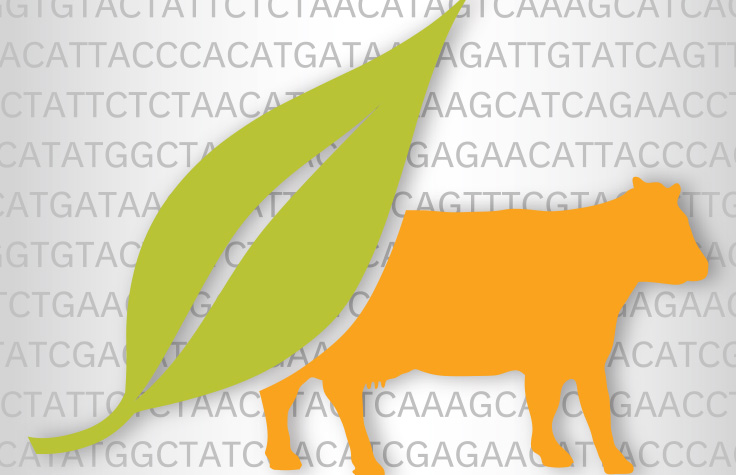
당사는 농업적으로 중요한 작물 및 가축의 유전형 분석을 위한 가장 포괄적인 어레이 옵션을 제공합니다. 맞춤형 유전형 분석 어레이는 모든 종에 대해 거의 모든 SNP를 조사할 수 있는 기능을 제공합니다. 식물 및 동물의 유전형 분석에 관하여 자세히 알아보세요.
유전체학 컨소시엄

Illumina는 비슷한 목표를 공유하는 연구자들이 자원을 통합하고 유전체학 도구(유전형 분석 어레이 및 시퀀싱 패널)를 만들기 위한 노력에 동참하도록 지원합니다. 컨소시엄 제품을 살펴보세요.
복합 질환 연구

변이가 식별되고 질병과 관련된 후, 표적 어레이 및 시퀀싱 방법은 복합 질환 연구자들이 변이가 질병 생물학에 어떤 영향을 미치는지 확인하는 데 도움이 될 수 있습니다. 복합 질환 유전체학에 대해 더 알아보세요.
암 생식계열 돌연변이 분석

표적 마이크로어레이와 차세대 시퀀싱을 사용하여 개인을 암에 취약한 상태로 만드는 생식세포 돌연변이를 식별하세요. 암 생식세포 돌연변이 연구에 대해 더 알아보기
